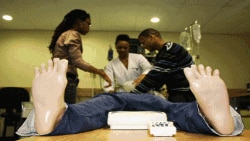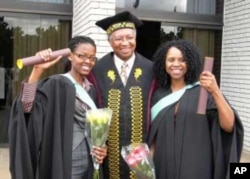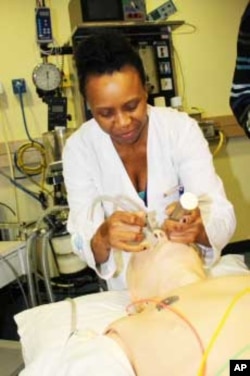A few years ago, their dreams were shattered by poverty, crime and a dysfunctional school system.
“Life was over before it had really started,” says Gerald Maarman (25). “I felt like a complete failure,” adds Bongiwe Tyhala (26). “I was preparing for unemployment or some desperate job like cleaning floors,” says Pumza Ghu (25).
But they, together with a program that’s been branded one of the most progressive ever in South African tertiary education, transformed their destinies. From being failures at mathematics and science, Tyhala, Ghu and Maarman are now on their way to becoming seasoned medical health professionals.
Tyhala and Ghu are medical interns, while Maarman is a medical physiologist researching the effects of new drugs on the human body. “To say they’ve overcome incredible challenges is putting it very, very modestly,” says Nokwanda Siyengo, manager of the SciMatus program at Stellenbosch University in South Africa’s Western Cape province.
The system fails some pupils
Ghu went to school in the Eastern Cape, one of the country’s poorest provinces. “There’s no schools there. If there’s schools, then there’s no teachers. If there’s teachers, there’s no textbooks (and) pieces of chalk,” she reflects. Ghu says her high school mathematics and science teacher was “always absent. We (pupils) had the responsibility of doing things for ourselves and no one was really guiding us. We kind of didn’t know if we were doing the right thing.”
Under these circumstances, Ghu says she “lost the love” she’d always had for the subjects.
Maarman also went to a school where pupils had to share textbooks and teachers lacked skill, but he says these were “minor” problems in comparison to others plaguing the institution. His school was on the Cape Flats outside Cape Town, an area notorious for gang- and drug-related violence. “Sometimes the school would just shut because the gangsters nearby were going crazy, shooting and everything,” says Maarman.
His and Ghu’s education was constantly disrupted by pupils and teachers boycotting the schools to protest the terrible conditions. “You were forced to join the boycott,” says Ghu. “If you showed in any way that you were opposed to the boycott, you could be a victim of violence at any time.”
Tyhala, who had been “excellent” at mathematics and science in the early years of high school, says she later “lost all powers of concentration” as a result of “personal problems.” She lived in Langa, an impoverished township near Cape Town.
These circumstances conspired to ensure that the three youngsters failed mathematics and science in their final exams. They couldn’t go to university. Realizing that the education system had failed him, Maarman reacted with “furious rebellion” that he says almost “derailed” him.
“Especially when I realized that my dream (of going to university), is now going to die, I was angry because I felt like school is the place where they’re supposed to teach you how to think. And they did exactly the opposite,” he states, before smiling broadly and adding, “But SciMatus was my light.”
SciMatus to the rescue
The Scimatus program recruits students who may have failed mathematics and science but who had previously showed potential in the disciplines. “We believe these students to be very clever people who have been stymied largely by a crisis-wracked schooling system,” explains Dr. Kosie Smit, SciMatus director. “We believe they deserve a second chance, so we give it to them.”
To do so, they employ some of the province’s best mathematics and science teachers. During a rigorous year, they instruct the Scimatus recruits – about 70 of them – in mathematics and science from South African school grades 10 to 12. “It’s three years of work packed into just one year, so it’s extremely grueling,” says Siyengo. But some recruits – like Tyhala, Ghu and Maarman – achieve the high marks necessary to enter university, and their tertiary studies are sponsored by the program.
Smit’s convinced that most SciMatus recruits succeed because – unlike in most South African schools – highly skilled teachers show them individual attention and teach them “critical thinking.”
Says Maarman, “When I went to SciMatus, they changed my thinking pattern by explaining to me how maths works, how science works, how you approach science, how you approach a problem. SciMatus…caused a paradigm shift in the way I was thinking.”
Success follows SciMatus
Following Maarman’s successful completion of the SciMatus program, he completed a Bachelor of Science degree in functional human biology and later received his Master’s. His thesis reveals the amazing extent of his progression from being a mathematics and science failure at school, to being recognized as one of the top medical research students in the long history of Stellenbosch University.
“For my thesis, I investigated the effects of a certain drug on the heart, on myocardial resistance to an attack,” Maarman explains. He subjected a rat’s heart to an attack, and then injected the heart with a drug to test the medicine’s effects.
The young man says his success offers evidence that many South African learners aren’t failing the country’s education system, “it’s failing them!”
After SciMatus, Tyhala and Ghu applied to study medicine and were accepted. Both acknowledge that despite their proven aptitudes for mathematics and science, they “struggled” through six years of study before finally gaining their medical degrees. Tyhala and Ghu are now in the process of completing two years of internship, following which they’ll be full-fledged medical doctors.
Both emphasize that they aren’t planning to be part of the exodus of South African doctors, who are increasingly shunning the country’s chaotic and rundown public health sector and leaving for more lucrative posts in the United States and Europe. Because of their impoverished past, say Tyhala and Ghu, they want to stay in South Africa “to make it a better place.”
Return to their roots
“I want to work in a place that gives me hands-on experience, a place without fancy equipment to make diagnoses,” says Tyhala. “I believe this will make me a better doctor.”
She adds that her medical intern colleagues from more privileged backgrounds are “always talking about how much money they’re going to make,” while she and Ghu “have different missions” because they understand the suffering of South Africa’s poor majority. In the country’s rural areas, sick people sometimes wait for days to see a doctor.
“People will not wake up at five in the morning and go to a clinic if they don’t have to. And we understand those people more than anyone else because once upon a time we were those people,” says. Tyhala. “We want to relieve the hardships that we ourselves once went through.”
Ghu plans to practice medicine in the province of her birth, the Eastern Cape. She wants to specialize in internal medicine and become a general practitioner.
Like Tyhala, Ghu plans to work in the public sector, rather than the more financially rewarding private sector. “Being in private (practice) wouldn’t be a challenge for me and I hate being bored,” she says. “That’s why I want to specialize in internal medicine – because I’m going to be on my toes the whole time; I’m going to have challenges.”
She adds, “Going to the public sector means going to where 80 percent of the population is; it’s going where the action is and that’s what I want. My job is to help those people who are too poor to afford private doctors.”
‘To totally reverse a heart attack….’
Following their unexpected success, the three young graduates are brimming with confidence.
“I’m going to do my PhD,” says Maarman. “Then I’d like to apply for a lecturing post at the university. I want to lecture, and I want to do medical research as well.” Then, he launches into an unprompted description of his ideal future.
“I’ll work with drugs, experiment with drugs. I will develop new drugs as treatment for certain diseases. I’ve got a few big things in the pipeline….”
Maarman’s enthusiasm is almost unbelievable, given that just a few short years ago he’d left school a “directionless, angry failure.” Gone are the days he spent moping in depression, pondering an “empty future.”
The void in his life has been filled with dreams -- Maarman wants to develop a drug that would be one of the greatest health discoveries in the history of humankind. “Where you can basically give a drug to people before they get a heart attack and that would protect their hearts from it,” he says, his eyes sparkling with hope.
This vision, from a young man who once had such low powers of comprehension that he couldn’t add and subtract properly.











